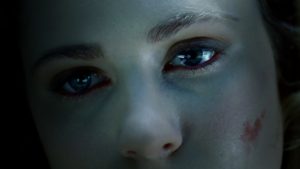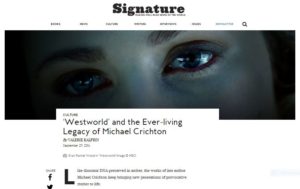
Evan Rachel Wood in “Westworld” / © HBO
By Valerie Kalfrin
Signature Reads, Sept. 29, 2016
Like dinosaur DNA preserved in amber, the works of late author Michael Crichton keep bringing new generations of provocative stories to life.
In early October 2016, HBO debuts Westworld, a series inspired by the 1973 film Crichton wrote and directed about a futuristic theme park in which the artificial life forms run wild. A sequel is in production for the 2015 film, Jurassic World, which grossed more than $1 billion worldwide at the box office and is based on characters and the concept of genetically engineered dinosaurs that Crichton hatched in his 1990 book, Jurassic Park. And the National Geographic Channel is developing a series based on Dragon Teeth, an as-yet unpublished manuscript of Crichton’s, purchased earlier this year by HarperCollins, about the real-life 1800s rivalry between paleontologists.
The man whose careerlong fascination with the what-ifs of science and technology still speaks to the zeitgeist, it seems.
“He knew so much about the technologies that were about to emerge, spent so much time thinking about how they would actually work,” said Jonathan Nolan (writer of Memento, The Dark Knight, and Interstellar), who with his wife, Lisa Joy Nolan, created HBO’s Westworld series. “One of the amazing things about Crichton is he was such a visionary. For much of science fiction, it felt like so many of the questions were a long way away. I actually think we’re in a moment now where these questions are close in the real world. … As exotic as they seemed years ago, they are now becoming very frighteningly relevant.”
Whereas 1973’s Westworld featured Yul Brynner as a robotic gunslinger that malfunctions and pursues the guests at an adult amusement park, the new series delves into more sociological issues and ethics surrounding the androids at the park, their creators, and the guests. The acclaimed cast includes Anthony Hopkins, Ed Harris, Evan Rachel Wood, James Marsden, Thandie Newton, and Jeffrey Wright.
Crichton, who died of cancer in 2008 at age sixty-six, graduated from Harvard Medical School but became a publishing powerhouse, selling roughly 150 million copies of his books worldwide, including the best-sellers The Andromeda Strain, Congo, Jurassic Park, Rising Sun, and Next. He also created the long-running TV show ER, which won him an Emmy, and directed eight films, including a 1979 adaptation of his book The Great Train Robbery, starring Sean Connery and Donald Sutherland.
Some critics were lukewarm about his prose, with The New Republic calling his books “pulp for the coach-class set” full of fact-heavy monologues and characters that “don’t represent real people so much as ideas.” Yet even if Crichton’s plots tended to rely on a third-act switch, such as a changing virus, his ideas undeniably caught the imagination, earning him nicknames like “pop fiction’s prime provocateur” and “king of the cinematic techno-thriller.”
“He was the greatest at blending science with big technical concepts,” Jurassic Park director and friend Steven Spielberg once said.
Crichton himself never put much stock in ideas alone. “I think people put too much emphasis on the ‘idea’ behind a story, anyway,” reads one passage from him on his official website. “First of all, there isn’t just one idea in a story, there are lots of ideas. And second, an idea by itself isn’t worth much until you do the work necessary to get it down on paper. And in the course of doing the writing, the idea often changes.”
Rather, he liked to follow his curiosity. “The ways that technology interests me are the ways that it traps you,” Crichton once said. “In a human situation, you can always call up your friend the next day and say you didn’t mean it. But you can’t call up technology, you often can’t change your mind. Once you set out on a given course, you can’t reverse.”
Crichton was known for including footnotes in his fiction to cite scientific research, but his strength was in making the fantastical believable. “He has maybe the richest imagination of anybody I know. And he grounds his fantasy in such contemporary technical reality that he can make the reader swallow just about anything,” Spielberg has stated.
Perhaps Crichton drew his storytelling techniques from one of his idols, Sir Arthur Conan Doyle. Crichton wrote an introduction to a reissue of Conan Doyle’s 1912 fantasy-adventure tale, The Lost World, praising the pacing and good humor that continue to make such stories work. ”Its author found a way to tell a fantasy story by inviting you to laugh at it and to believe it at the same time,” Crichton wrote. “It is a technique that has been used many times since, particularly in movies.”

